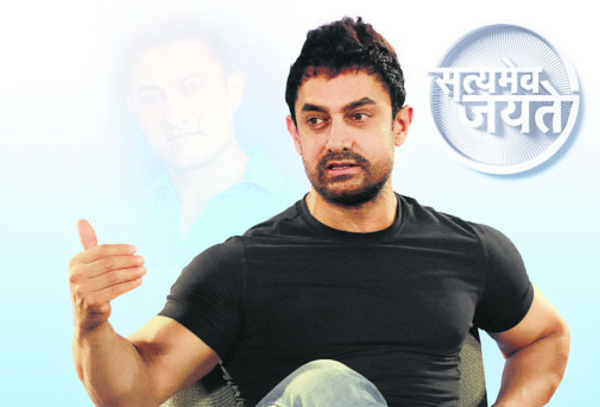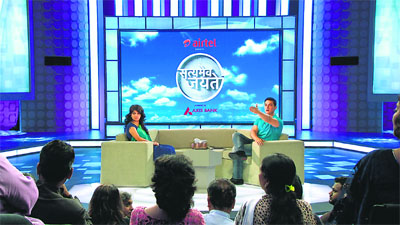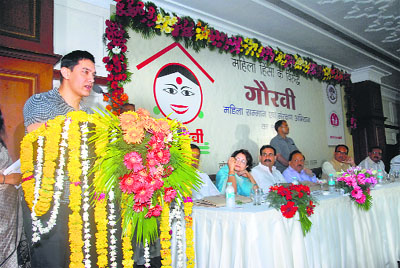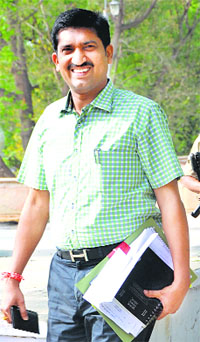
The importance of being Aamir
11.02.2015
tribuneindia.com, 30 ноября 2014 г.

The importance of being Aamir
With Satyamev Jayate, Aamir Khan has taken celebrity activism to an all-new level.
IT isn’t unusual for Bollywood celebs to espouse social causes. But nobody has used movie stardom as a tool for change quite as effectively as Aamir Khan. The Bollywood superstar, who backs unconventional stories on the big screen, has taken high-profile activism to a new level.
Satyamev Jayate, which Aamir has hosted since the launch of its first season in 2012, has had a tremendous nationwide impact and has triggered meaningful action on the ground.
Senior television journalist Dibang, the anchor of Mumkin Hai, a live Q&A session that aired as part of the main two-hour show in the just-concluded third season of Satyamev Jayate, pointed out on air, Aamir spent only 10 days on a film set in 2014 — for a schedule of Rajkumar Hirani’s P.K. He devoted all the rest of his time to Satyamev Jayate.

The star’s commitment has paid off. Satyamev Jayate, which kicked off with 13 episodes in 2012, has inspired change leaders around the country to push their agendas with greater vigour than ever before. Ten more episodes of the show have since been aired, five each in 2013 and 2014.
The show combines the essential tenets of journalism and field research with engaging storytelling. The blend helps in grabbing the attention of viewers and getting them to watch and absorb the information provided by the show.
As Dibang pointed out in the final episode of Mumkin Hai, journalists usually work with numbers and statistics, but Satyamev Jayate puts relatable faces to all the news stories that appear in newspapers and on television channels.
Aamir attributes his involvement with Satyamev Jayate to the show’s director and his long-time friend Satyajit Bhatkal. Speaking at a MIP Mega Session at MIPCOM 2014 (an annual event in Cannes where the world goes to buy and sell entertainment programmes especially for television), the Rang De Basanti and 3 Idiotsactor said: "It all started because I was inspired by Satya, who was my friend from school and a class topper. He was working in the social space but I being an actor doing well in my career wasn’t doing much in this area."
 The phenomenal reach of the show is no mean measure due to the three pre-conditions that Aamir laid down before he came on board. He insisted that Satyamev Jayate should be available in all Indian languages, it should be aired on even rival channels in parts of the country where STAR Plus does not have a presence, and it should be aired on Doordarshan’s terrestrial network too.
The phenomenal reach of the show is no mean measure due to the three pre-conditions that Aamir laid down before he came on board. He insisted that Satyamev Jayate should be available in all Indian languages, it should be aired on even rival channels in parts of the country where STAR Plus does not have a presence, and it should be aired on Doordarshan’s terrestrial network too.As a result, 600 million people watch Satyamev Jayate every week and the show has thus far raised $45 million for the NGOs that it is associated with.
Such has been the impact of Satyamev Jayate that after the episode on manual scavenging was telecast in 2012, the Maharashtra Government announced that the practice would be abolished in the state within two days.
What’s more, the very next year Parliament passed a law barring the employment as manual scavengers. And this is only one of the many successes that Satyamev Jayate has had in bringing about real change.
While movie stars like Salman Khan have their own NGOs that do their bit by extending help to the needy and deserving at the individual level, Aamir has chosen to play the game differently. He addresses ‘big-picture’ issues through a television show that reaches out to the entire country.

Says Dibang: "With Aamir Khan at the centre of it all, the message becomes louder and far more potent than it otherwise would be." It is undeniable: when Aamir speaks, people listen — and act.
At the end of the first season’s episode on alcohol abuse, Pune’s Muktangan Mitra de-addiction centre collected Rs 4.37 lakh instantly, half of it through contributions pledged via SMSes and the rest from Nita Ambani’s Reliance Foundation.
Muktangan, for its efforts, has won the 2014 National Award in the field of Prevention of Alcoholism and Substance Abuse.
That Aamir is taken seriously by people who matter was illustrated by the three tweets that came in from Union Sports Minister Sarbananda Sonowal during episode 1 of season 3, which highlighted the need to improve Indian sports. The minister made a public vow via Twitter even as the show was being aired: "I promise not to leave any stone unturned to make sports a way of life."
Each episode of Satyamev Jayate has delivered a similar call to urgent action aimed at both the general public and the establishment. The response has been overwhelming.
In the last episode of season 3, devoted to dissecting the skewed notions of masculinity that reign in India, 18 lakh missed calls were received to indicate a ‘yes’ to the question: Should Hindi cinema stop treating women as ‘objects’ and ‘items’?
In many cases, Satyamev Jayate has been able to galvanise administrative action. Thanks to the interventions of Gwalior’s district collector, Parikipandla Narahari, almost the entire city is today disabled-friendly in response to an exhortation made in Satyamev Jayate in season 1.
Gwalior district also been recognised in the e-health domain for designing an Active Tracker device to eradicate female foeticide, which was the theme of the inaugural SMJ episode in 2012.
Madhya Pradesh seems to have been most influenced by Aamir Khan’s appeals. The state has launched Gauravi, India’s first one-stop crisis centre for women who have fallen victim to domestic or sexual violence. The centre, set up in a Bhopal hospital, has come up with the help of the NGO, Action Aid.
Madhya Pradesh has also made generic medicines available all across the state. This is in response to aSatyamev Jayate episode which highlighted the problems faced by common citizens on account of the exorbitantly high cost of branded medicines.
Never has an Indian television show turned into a social movement quite in the manner that Satyamev Jayate has. With Aamir Khan as the super successful show’s visible face, it can be safely surmised that there is more to come.
STARRY IMPACT
It is obvious that Aamir Khan is acutely aware of the power of his stardom. His appreciation of what he can achieve as a movie actor is reflected as much in the views he airs as in the films that he chooses to be associated with.
In the past decade, Aamir has done his share of blockbusters like Ghajini and Dhoom 3. But he has also featured in Rang De Basanti, Taare Zameen Par, 3 Idiots and Dhobi Ghat, films that have sought to go beyond the limits of commercial cinema to articulate specific social concerns.
Not only that, Aamir lent his name to Peepli Live, Anusha Rizvi’s take on farmer suicides and the role of the media in the coverage of issues related to rural poverty.
Nor is his politics confined to films alone. In 2006, he lent vocal support to Medha Patkar’s Narmad Bachao Andolan when the Gujarat government decided to raise the height of the dam on the river. He has to pay a price: the release of his film, Fanaa, was blocked temporarily in Gujarat. In 2011, he came out openly in favour of Anna Hazare’s anti-corruption agitation.
Satyamev Jayate is only an extension of the socially conscious public persona that Aamir has consciously and actively sought for himself.
Saibal Chatterjee, tribuneindia.com
Комментарии